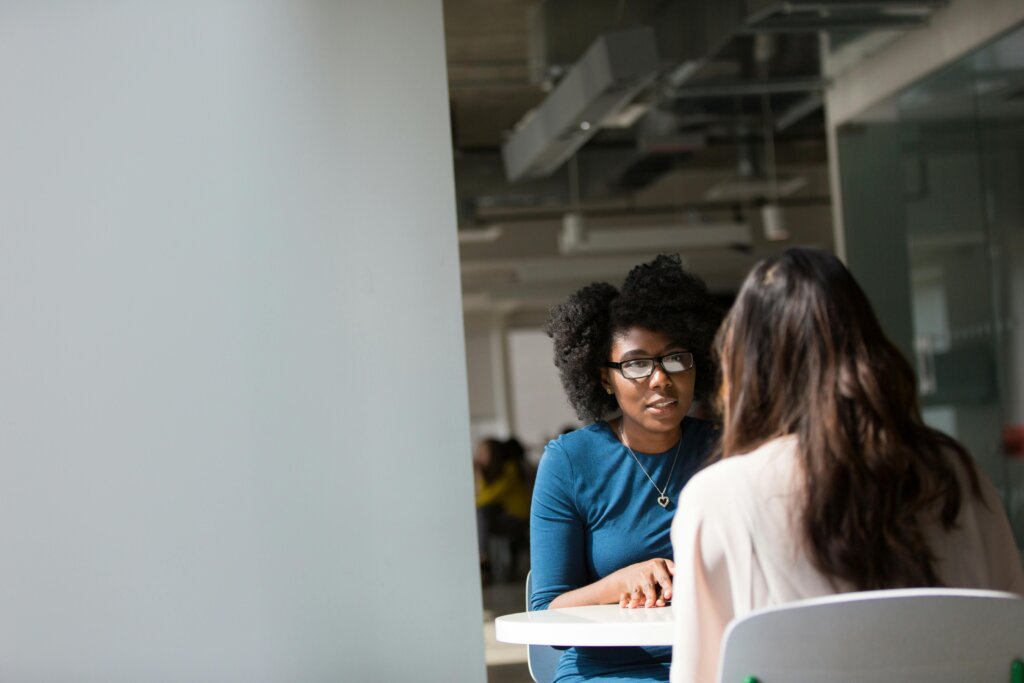Professor Tania Singer, psychologist, social neuroscientist, scientific head of the Max Planck Society’s Social Neuroscience Lab in Berlin, and board member of the Global Compassion Coalition has for many years been developing interventions based on mental practices done with a partner, known as “Dyads.” A growing body of research coming out of a large-scale project conducted during the Covid19 pandemic, the CovSocial project, is now helping to show that these inter-relational practices are not only effective in supporting participants mental wellbeing and resilience but in overcoming social divides, reducing loneliness, and improving human-to-human connection.
What are Dyads?

Dyads refer to interactions between two people.
In the context of psychology, a dyad will normally involve a planned interaction between two people, usually with the purpose of exploring personal experiences, strengthening connections, or achieving therapeutic outcomes.
Contemplative dyads are a special form of meditation done with another partner, where one is exploring a certain question or experience and the other is listening without judgement and interruption. The aim is to enhance deeper understanding through a loudly exploring inner dialogue with a silent witness.
The type of contemplative Dyad programs Tania Singer has developed over the last decade is a skill learning approach in which she uses daily Dyad practice over many weeks in participants everyday live to cultivate specific skills such as coping with difficult emotions, learning empathic listening or building resilience through gratitude, acceptance and care. This skill-learning approach is supported by weekly coaching sessions lead by trained Dyad trainer to assure psychological safety during this intimate practice and deepen the practice through specific teachings. Partners are randomly paired with another partner and changes weekly their partner to allow for the cultivation of more tolerance and the development of a shared sense of common humanity
Why Dyads?
Unlike solitary meditation or mindfulness practices, Dyads involve structured interactions between pairs of individuals.
This brings added benefits. It can help cultivate social emotions and social cognition. Thus, it is easier to learn how to listen empathically if there is another speaking. It is easier to develop tolerance or compassion for others if there is actually a real person on the other side. Further, it helps commitment to practice as you have a daily social rendezvous with another person you don’t want to let down. It creates connection, help reduce prejudice, overcome boundaries, and foster a sense of common humanity. With roots in ancient meditation traditions and recent advancements in social neuroscience, dyadic practices have emerged as a powerful tool for cultivating social skills and promoting resilience in diverse populations.
The Structure of Tania Singers Dyad programs

Dyads usually last 10-15 minutes and consist of structured interactions between pairs of individuals with alternating roles between a speaker and a listener.
The speaker responds to a prompt, a specific question, designed to provoke personal reflection of emotional experiences or perspectives, while the listener engages in empathic listening without judgement. In Tania Singer’s approach, typically, there are two specific questions to which speakers have to answer in a specific sequence and the second question acts as an antidote to the first one.
The so-called Affect Dyad for example consists of two questions which are aiming first at exploring and cultivating a deeper understanding and acceptance of experienced challenging emotions (tell me a situation of the last 24 hours in which you experienced a difficult emotion and how did it feel in your body) and a second question related to the experience of gratitude (tell be a situation of the last 24 hours in which you experienced gratitude and how did it feel in your body). The second part of the question is essential as it helps cultivate interoceptive body awareness.
The scientific evidence
A recent large-scale mental health study from Tania Singer’s Social Neuroscience Lab in Berlin, conducted during the years of the Covid19 pandemic, the CovSocial project, has compared the effects of 10-week online inter-relational Dyad training with classic mindfulness-based training practiced daily alone. A growing body of recently published results has revealed the power and effectiveness of such app-based daily Dyad approach.
After the 10-week socio-emotional dyadic intervention, participants report heightened bodily and emotional awareness, increased empathy, compassion for the self and for other people and a greater sense of social connectedness. Further, another study showed improved resilience and reduced depression, anxiety, stress and loneliness among dyad practitioners. Importantly, these benefits are observed even among individuals with no prior meditation experience as this was an exclusion criterion from the study, highlighting the accessibility and efficacy of dyadic interventions for everyone.
Opportunities for scale
The fact that these powerful findings are based on a purely online and app-based intervention means that dyadic practices can be exponentially scaled. Online programs provide an accessible and flexible approach to practising Dyads, allowing individuals to reap the benefits of contemplative practices from the comfort of their homes. Moreover, digital platforms and the fact that you can also do these Dyads over your cell phone allow for the dissemination of evidence-based practices to diverse populations, transcending geographical barriers and promoting inclusive access to mental health resources.
Future directions
Tania and her colleagues are now looking at how dyads can be used to bring wider, social benefits. In her ReConnect! masterclasses and journeys, she is already teaching these Dyad programs to different arms of society. In the context of her ongoing research and new Edu:Social project, she is expanding her research into investigating the effects of dyadic practices in the context of education and healthcare. Studies are exploring how dyads can not only benefit teachers’ or health-care workers’ mental health but also might have a ripple effect that changes classroom dynamics for the better, improves patient outcomes and shifts organizational culture.
www.social.mpg.de
